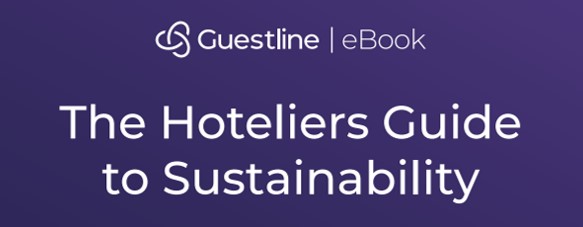By Sophie Cartwright, Marketing Communications Manager, Guestline: Stepping stones towards sustainability.


Sustainability is a topic that quite rightly continues to dominate agendas. Following the COP27 Conference in November last year all eyes are increasingly focused on how businesses operate, the impact they have on the environment and the measures they are taking to reduce this.
For hospitality owners and operators also working to navigate the challenges of rising costs and staffing, it can seem at times a daunting and confusing process to undertake. We all understand and recognise the need to reduce our carbon footprint and improve sustainability so that resources are available for future generations. Knowing how and where to go it about however, is not always clear so how do you take those first steps on the road towards sustainability?
Considerations
When embarking on your sustainability journey, as with any significant operational change, ensure you take the time to clearly set out specific goals and identify the ways and means to achieve them.
Whether it be increasing the use of local producers, installing timed water meters in gardens, preparing for the ban on single use plastics announced by the Government, or reducing the need for paper with digital check-in and check-out. Clearly identify where you can achieve change and implement a timeframe with specific actions against it and as part of other operational demands, to ensure it is not only realistic but also kept on track. It is also worthwhile appointing team members to lead on these changes and become ambassadors for sustainability both within your team and with guests, both of which want and need to know about the steps being taken.
There is, of course, a price tag attached to installing more energy efficient appliances and practices so from a profit and loss perspective maintaining a long-term view is critical to the success of any sustainability project. Whilst paying out in the short term will see an impact, bear in mind that a reduction in energy bills and being able to avoid government penalties for unsustainable operations will ensure a solid return on any investment in the long term. As much as possible prepare your balance sheet in advance so it is sustainable and achievable for your cashflow as well as the environment.
Taking action
Reassuringly there are now many ways that as hospitality owners and operators you can work to become more sustainable. Best practice measures can be put in place across all areas of operations, from guest services to maintenance, logistics and suppliers.
Short, medium and long-term actions all have an important contribution to make. Short term examples include encouraging guests to reduce how often linens are changed, donating leftover food to local food banks and switching to LED lighting. Medium term consider reducing the use of plastic key cards with keyless entry systems and choosing furniture made from recycled materials or upcycling existing furniture. Longer term initiatives often include larger scale installations such as solar panels, triple glazed windows, separate heating, ventilation and air conditioning systems and low flow toilets, to name just a few examples. Again, with all of these initiatives, ensure you have a clear idea of costs and timescales before embarking on any changes.
Keep sustainability front of mind and keep honest
As many operators can attest to sustainability is a priority for guests in the booking process and staff in the recruitment process. But to ensure that any investment and action you take has longevity, it is vital that all members of staff know and understand the steps being taken so that they can also ensure it is a fundamental part of their job role. Saying that is all very well but what can you actually do to get team buy-in? Some simple and straightforward ideas include offering a vegan option at lunchtimes, provide reusable water bottles for all staff and make end of day unplugging of screens and appliances mandatory for all. Support with a reward scheme for the most sustainable member of the team and a monthly prize for those who are making a real effort to effect change.
Encouraging buy-in from your team will also encourage buy-in and, importantly, loyalty from guests. Since the return of travel post-pandemic there have been numerous studies into traveller priorities and unquestionably sustainability continues to dominate. Operators who fail to act with sustainability in mind now run the very real and present risk of losing guests both now and in the future.
At a global scale, across every industry and government, goals are being set for sustainability. Companies are responding with their own investments and initiatives to achieve this. Promoting sustainability does however come with a word of warning and that is green-washing. Green-washing is the phrase assigned to those companies who claim to be greener (more sustainable) than they are and for those that are found out the damage to brand reputation and subsequent consequences can be severe. Indeed, it is believed the EU is currently drafting plans for a new crack down on companies who are found to make misleading or false claims about their green credentials with the implementation of proportionate penalties, and this is expected to remain front and centre of government agendas.
Expert advice
Once you have confirmed your sustainability objectives, assigned a budget and team members to develop and implement a plan to realise them, consider speaking to the experts who will be able to advise you and keep you plan on track. Reassuringly there are now a number of established organisations you can speak to for guidance, including the Sustainable Hospitality Alliance which works to bring the hospitality industry together to act on positive change and Green Tourism which offers advice for businesses and organisations on how to run operations in a more sustainable way.
Sustainability is an ongoing requirement and any steps undertaken should also be recognised with certification from a credible external authority. There are now many organisations that offer certification so again take the time to do your due diligence and ensure any certification you work towards is recognised and respected. Green Globe and Earth Check are two of the leading advisory and certification organisations and will offer robust inspections to ensure you are operating and adhering to the highest sustainable standards. Again, this will require investment, but the returns both now and in the long term certainly add up.
Guestline, the leading provider of hospitality technology solutions has published an e-book to offer hoteliers advice on how to make the step towards sustainability which is free and available to download here.
More information about Guestline is available here.

